IRGC Breaks Protocol, Summons Swiss Ambassador Amid Attack On Israel
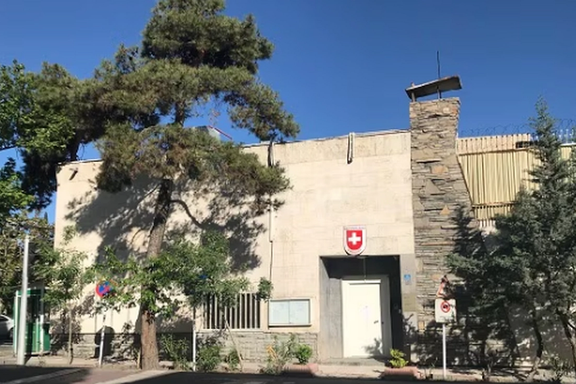
The Iranian Revolutionary Guard Corps (IRGC) summoned the Swiss ambassador during the attack on Israel, a New York Times report on Wednesday confirmed.

The Iranian Revolutionary Guard Corps (IRGC) summoned the Swiss ambassador during the attack on Israel, a New York Times report on Wednesday confirmed.
Mojtaba Abtahi, an adviser to the Iranian Interior Minister, previously claimed that the Swiss Ambassador was summoned to the IRGC instead of the Foreign Ministry at 3 a.m. during Iran's first ever direct attack on Israel.
Tehran launched 350 or more missiles and combat drones on Saturday night in retaliation for Israel's April 1 air strike on the Iranian consulate in Damascus, killing a senior IRGC-Quds Force commander and several IRGC personnel.
Israeli forces, backed by the US and other allies, stated that approximately 99% of the incoming threats were destroyed, while the few that survived caused only minor damage. As tensions in the region mount, Iran is preparing for possible retaliatory attacks either on its territories or its proxies.
Speaking to Swiss Ambassador Nadine Lozano, the IRGC apparently broke protocol and warned her that "The IRGC would destroy the entire region if the US took even the slightest action", showing the true political force of the IRGC in Tehran.
Since 1980 following the attack on the US embassy in Iran, Switzerland has played a crucial role in representing US interests in Iran. It serves as a go-between for US interests in Iran during escalating tensions. However, summoning an ambassador to a military base, a clear violation of diplomatic protocols, is a highly unusual event. As of now, Switzerland and the US have yet to respond to this breach of diplomatic norms.
Mojtaba Abtahi, who also holds the title of Secretary-General of the International Conference on Supporting Palestine Intifada, referred to the action of IRGC as simply "military diplomacy."
In recent years, the IRGC has developed a more significant influence within the Iranian government and has broadened its influence outside the military to include other fields, such as economics.
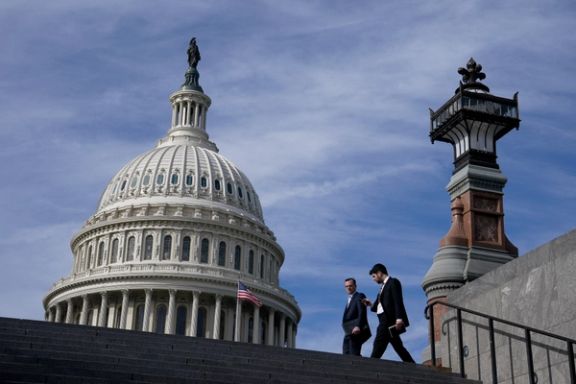
The Mahsa Act looks set to be incorporated into a wide scale aid package in Washington on Saturday, aiming to weaken Iran and its allies.
It has been packaged along with a raft of sanctions to crack down on Iran’s missile program, human rights abuses and support to its terror proxies in Palestine. As a measure tightening the grip on Iran, it is dubbed, the “21st Century Peace Through Strength Act”.
House Foreign Affairs Committee Chairman Michael McCaul introduced the legislation which he said was a means of confronting Iran and its allies China and Russia through a series of new sanctions as the three continue to destabilize global geopolitics.
“In order to truly confront the generational threat posed by the unholy alliance of Russia, China, and Iran, we need to make substantive policy changes in addition to providing critical security assistance to our partners and investing in our defense industrial base,” he said.
“I’m proud the ’21st Century Peace through Strength Act’ includes the most comprehensive sanctions against Iran Congress has passed in years; the bipartisan, bicameral REPO Act; and protects Americans from the malign influence of the CCP-controlled TikTok. The time to pass this is now – we cannot wait anymore.”
The bills have to pass a full Senate vote and be signed by the President to become law but it has finally overcome the Senate Foreign Relations Committee (SFRC) hurdle.
The Mahsa pillar will be called the Mahsa Amini Human rights and Security Accountability Act or simply the MAHSA Act, and will see the imposition of sanctions on Iran’s supreme leader’s office, its appointees and anyone affiliated with the office and its work.
It is a huge nod to the impact that the 22-year-old’s death has had globally since September 2022. Killed in morality-police custody after her arrest for not wearing her hijab properly, her tragic death sparked a nationwide uprising in which hundreds of Iranians were murdered in the hands of security forces.
Crackdowns on women defying the hijab continue to worsen, this week the Noor project seeing scores of morality police patrols back on the streets of Tehran.
The MAHSA Act had held back from the committee for a long time after it passed the House and was said to be heavily ‘diluted’ before being sent to the floor for vote.
The bill, titled the Mahsa Amini Human Rights and Security Accountability Act, was first introduced to the US Congress in January 2023, four months after the start of nationwide protests in Iran.
In its original version, the Mahsa Act required the US government to impose applicable sanctions on Iran’s Supreme Leader Ali Khamenei, his Office and his appointees, Iran’s president and a number of entities affiliated with Khamenei.
It also required the US President to report to Congress every year whether those officials should remain under existing sanctions, making it much harder for the current and future administrations to unilaterally lift the sanctions.
The new legislation package now includes provisions pulled from multiple pieces of legislation from the House Foreign Affairs Committee Republicans, including giving the executive branch the power to transfer frozen Russian sovereign assets to Ukraine to help Ukraine stay in the war and eventually rebuild.
Mandatory sanctions will be levied against Iran-backed Hamas which on October 7 waged war on Israel, sparking the current region-wide conflict led by Iran and its proxies. That will extend to fellow Iran-backed militias in Palestine, Palestinian Islamic Jihad, Al-Asqa Martyr’s Brigade, the Lion’s Den, and other Palestinian terrorist groups and their supporters.
There will also be sanctions on ports and refineries that receive and process Iranian oil and measures to further restrict "the export or re-export of US-origin goods and technology to Iran, including those used to manufacture missiles and drones attacking our forces across the Middle East and by Vladimir Putin against Ukraine”, it said.
Since the Gaza war broke out on October 7 alone, over 200 attacks were launched by Iranian proxies against US forces and facilities. Iran continues to work with Russia to manufacture drones for the use in the war on Ukraine.
Anyone involved in activity covered under the UN missile embargo on Iran that lapsed in October 2023 will be sanctioned in addition to anyone involved in the supply, sale, or transfer of, or support for, Iran’s missiles and drones program.
The bill will call to fully enforce human rights sanctions on Iran as human rights abuses continue. Just last year, almost 900 executions took place in a record year for the regime. Minorities continue to be persecuted and the likes of internet freedoms continue to be restricted. According to Freedom House, Iran is one of the least free countries in the world. Over 70 journalists last year alone were arrested for writing dissenting views.
As Iran’s biggest consumer of oil, the law “requires the president to periodically determine whether a Chinese financial institution has engaged in the purchase of petroleum or petroleum products from Iran” in a bid to weaken the mechanisms Iran is using to bypass sanctions.
It will also require the president to “brief Congress on the finances of Iranian leadership and require financial institutions to close accounts connected to these individuals” as economic restrictions remain a key tool to strangle Tehran’s grip.
Amid the war in Gaza, waged by Hamas, killing 1,200 mostly civilians on October 7 and taking 250 more hostage, the bill also aims to disrupt “the ability of Hamas to fund terrorism, and makes it harder for state sponsors of terrorism to abuse International Monetary Fund resources to finance terrorist organizations, including Hamas, Palestinian Islamic Jihad, and Hezbollah”.
The war in Gaza has brought to light the power of Iran which The Times recently revealed paid £200m ($250m) towards its war effort in addition to training and arming the militias.
Former Iran advisor to the State Department, Gabriel Noronha, said the new bill is “a strong bill that imposes sanctions on anyone involved in Iran's missile/drone program and forces the administration to answer tough questions”.
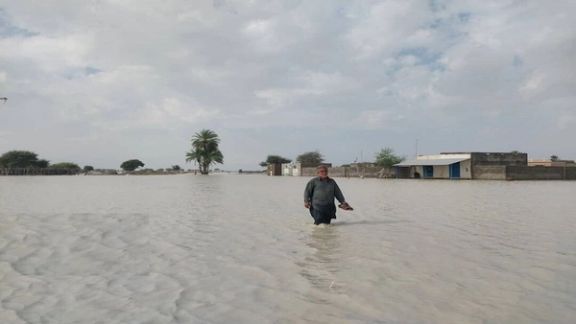
Heavy rainfalls and flooding of local rivers have so far claimed the lives of at least eight people in Sistan-Baluchestan, dealing a heavy blow to the infrastructure of the southeastern Iranian province.
According to the Iranian Red Crescent Society, the flooding resulted in the collapse of a loader and the deaths of three employees of Iran’s Railway company in Khash to Iranshahr road.
Meanwhile, Majid Mohebbi, the director general of Sistan-Baluchestan’s Crisis Management Department, said that heavy rains and flooding caused the closure of 45 rural roads, 12 sub-roads and one main road in the south of the province.
We have reports of the disconnection of telecommunications in 60 villages of Zarabad, Konarak and Chabahar towns due to a problem in their optical fiber, Mohebbi said, further adding that the amount of rainfall in the last two days in the province has “exceeded the forecast.”
A 5-year-old Baloch girl in the village of Kach, Dashtiari district, lost her life after falling into a water hole created due to recent rains and floods.
According to the Iranian media, the relief forces managed to rescue 70 passengers of three buses which were caught in flood on Nikshahr-Chabahar route.
Local officials have urged people to take precautions and avoid unnecessary travels in the province.
Issa Ghazi, agricultural director of Konarak, said that according to the preliminary estimates, the heavy rains over the past two days inflicted more than 5,000 billion rials ($8 million) of damage to the facilities and infrastructure of the agricultural sector, including poultry houses, orchards and farms.
In Nikshahr, 12 villages have lost power as a result of heavy rainfalls and storms.
In a statement issued on Thursday, Sistan and Baluchestan’s Department of Environment warned of the detrimental impacts of the recent flooding on the wildlife.
“Following recent rains, flooding of all rivers and collapse of most dams in the province, it is not unexpected to witness stress and tension in wildlife, especially among native crocodiles. There is a possibility that the crocodiles will leave their primary habitat pond,” the statement added.
Mugger crocodiles, also known as “gando” in the local Baluchi dialect, are medium-sized broad-snouted crocodiles native to southeastern Iran and the Indian subcontinent.
State-sponsored Borna news agency wrote that despite its damages, the heavy rainfalls “revived hopes for an end to the drought” in the province.
In February, the torrential rains in southern Sistan-Baluchestan triggered extensive flooding, particularly in the Dashtyari region, leading to submerged residential areas and the closure of numerous roads. Hundreds of households also incurred damage due to the floods.
Back then, the government was taken to task over its failure to implement adequate flood management measures.
Furthermore, monsoon rains in the province in July 2023 led to the flooding of local rivers, closure of at least 42 roads and damage to hundreds of hectares of palm groves – an important source of income in the impoverished and arid region.
Experts attribute the recent flooding in Sistan-Baluchestan, a heavily drought-stricken region, to the consequences of global warming and climate change.
In an interview with Etemad daily Mehdi Zare, a geologist, remarked that “global warming tends to increase the intensity of extreme rainfall events,” further adding heavy rainfall is a telling aspect of the water cycle.
Sistan-Baluchistan is an economically challenged province in southeastern Iran adjacent to Afghanistan and Pakistan and home to a substantial Sunni community, which has been largely oppressed by the Iranian regime over the past decades.
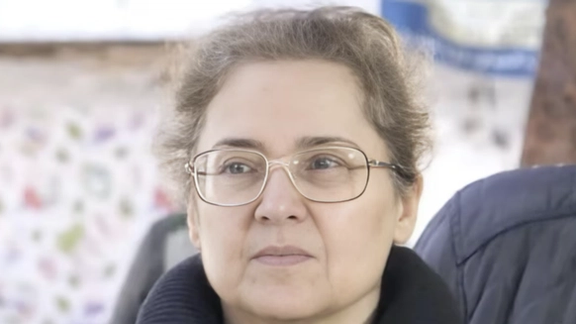
Activist and Islamic scholar Sedigheh Vasmaghi, imprisoned for her opposition to the mandatory hijab in Iran, was sent to hospital from Tehran's notorious Evin prison on Monday without a headscarf.
It is an unprecedented move from Iran's authorities who refuse treatment to prisoners unless they comply with compulsory hijab regulations. High profile cases such as Nobel Laureate Narges Mohammadi have been the face of the regime's brutality for prisoners compelled to wear hijab in exchange for medical treatment. Mohammadi was the sole activist reportedly granted hospital visits without hijab on three separate occasions.
Vasmaghi's Instagram account reported on Wednesday that she was taken to the hospital for eye tests with three male and female agents while refusing to wear a headscarf. It is unclear how the regulations were waived when so many cases have been denied treatment.
The outspoken activist was arrested in early March for her criticism of the compulsory hijab law and for describing Supreme Leader Ali Khamenei as a “dictator” and the regime in power as “oppressive.”
Over 300 political and civil activists in Iran have campaigned for her release in the past week and expressed concern for her health. They expressed their dismay that Vasmaghi had been imprisoned despite her severe visual impairment.
Prior to this, Vasmaghi was denied access to adequate medical care. Iran International had learned from a family source that her health deteriorated on Monday morning, with her heart rate exceeding 120 and her blood pressure exceeding 160.
Narges Mohammadi, a Nobel laureate and jailed Iranian human rights activist, also expressed concern about Vasmaghi’s well-being and wrote on her Instagram account on April 2: "I protest against the government's terrible and deadly repression against Iranian women."
Nevertheless, Vasmaghi, the former professor at Tehran's university, has been vocal in her protests while in prison. Against the backdrop of Iran's recent crackdown on women for hijab rules, in a message from April 2024, Vasmaghi condemned the government's actions as "antipatriotic and contrary to national interests."
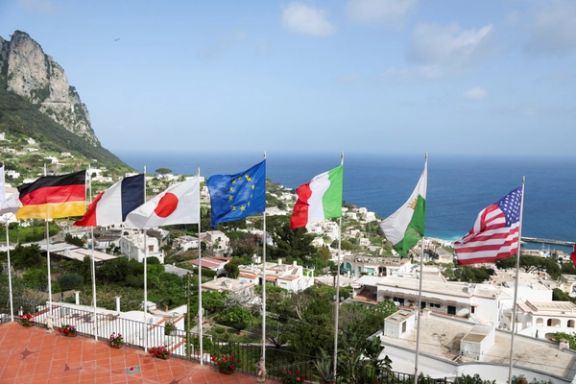
The finance ministers of the Group of Seven (G-7) condemned Iran’s “unprecedented attack” against Israeli territory, vowing close cooperation to impose new sanctions on Tehran.
“We will ensure close coordination of any future measure to diminish Iran’s ability to acquire, produce, or transfer weapons to support its destabilizing regional activities,” read the statement released Wednesday by G-7 finance ministers following negotiations on the sidelines of the International Monetary Fund and World Bank Group Spring Meetings in Washington, DC.
The ministers also warned against any regional escalation and its concomitant economic risks, particularly those to international shipping.
Italian Foreign Minister Antonio Tajani, who hosts this round of G7 summit, said Thursday that the foreign ministers of the group “will address the most sensitive issues on the agenda.” He elaborated, “We will certainly discuss the Middle East issue. We are friends of Israel, and we support Israel, but we want de-escalation in that area. We will also have to address how to sanction Iran in some way for the attack with hundreds of missiles and drones against Israel.”
“We will also have to deal with the other situation in the Middle East, and the maritime traffic through Suez and the Red Sea, an issue that involves all our countries since the merchant traffic is threatened by the Houthis,” he added.
Since November, Iran-backed Yemeni Houthis have been engaged in a blockade in the Red Sea, the Gulf of Aden, and the Bab el-Mandeb Strait in a bid to force a ceasefire on Israel. The group launched its campaign to attack Israeli vessels but it has since expanded to all global shipping.
On Saturday, Iran's Revolutionary Guard seized a Portuguese-flagged cargo ship that they said was "affiliated with" Israel near the Strait of Hormuz.
Meanwhile, European Union leaders pledged more sanctions against Iran, urging the regime and its proxies to put an end to their attacks in the region.
The EU “will take further restrictive measures against Iran, notably in relation to unmanned aerial vehicles and missiles,” said the statement issued Wednesday after the first day of the bloc leaders’ summit in Brussels.
On Saturday night, Iran launched its first ever direct offensive against Israeli territory with more than 350 drones and cruise and ballistic missiles.
French President Emanuel Macron stressed that the new sanctions should target “those who are helping to produce the missiles and drones that were used” in Iran’s offensive.
Israeli Foreign Minister Israel Katz welcomed the EU's decision to ramp up Iran’s sanctions, calling it “an important step on the way to defanging the snake.” According to Katz, “Iran must be stopped now before it is too late.”
Amid a wave of international condemnation, the Permanent Representatives of 48 countries at the United Nations condemned Iran’s attack on Israeli territory in a joint statement on Wednesday.
“We unequivocally condemn the April 13 attacks by the Islamic Republic of Iran and its militant partners on the State of Israel, which involved launching several hundred ballistic missiles, cruise missiles and attack drones against multiple targets, and note this large-scale attack could have caused significant damage and loss of life,” read the statement.
They also lambasted Iran’s move to “violate” the airspace of several regional countries such as Jordan which helped intercept the barrage, noting that it endangered the lives of innocent people.
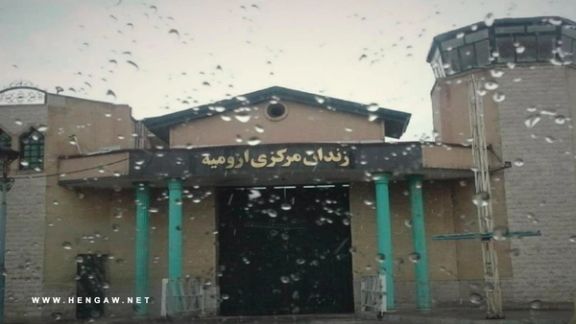
A Kurdish political prisoner who self-immolated at the Central Prison of Orumieh, was transferred to solitary confinement after going on hunger strike.
According to Hengaw Human Rights Organization, Hassan Omarpour, 29, who went on strike to protest his prison conditions and the prosecutor's harsh treatment of his family who have also been intimidated since his imprisonment, has been deprived of all his fundamental rights since Sunday.
Omarpour was sentenced to 10 years in prison in March last year on the charge of "cooperating with Israeli intelligence and espionage."
A year earlier, he and nine other citizens were arrested on similar charges. Following several months of torture in solitary cells, four were executed in January, according to Hengaw.
Omarpour self-immolated in February in response to prison guards attacking him and his inmates.
Kurds continue to come under disproportionate oppression in Iran along with minorities such as the Bahai and Baluch.
Of last year’s record numbers of executions, large numbers were Kurds and minorities.






